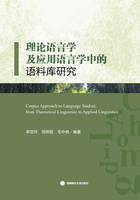
4. The choice between I, we and other impersonal expressions
On the one hand, if a writer of an academic text wants to present himself/herself and display commitment in the texts, one common linguistic choice is the employment of the FPPs. On the other hand, if a writer wants to maintain distance from the proposition and to sound objective, or to assert general truth, or to be more conventional to the academic style he/she may choose various impersonal expressions. For instance, he/she could use the passive voice or utilise reporting sentence structures.
In fact, the instances of I and we that are used to refer to writer themselves can all be substituted by other impersonal expressions if the students wish to avoid using the two FPPs. The rhetorical devices could be the employment of passive voice(for example, use It is found that to replace I found), or some conventionalised academic expressions(for example, use as mentioned to replace as I have mentioned), or report structures of it...that or it is...to. In other words, the writers' points of views are expressed by using the inanimate it as the subject of sentences and disguises the writers'presence. For example, the phrase it is believed that in Example 1(note the code indicate the subcorpora of UG/PG sample texts with their assigned digital number in the corpus).
1 It is believed that the long-lasting love between them inspires many of Galsworthy's stories and that Ada is the prototype of Irene in The Forsyte Saga. We can sense the author's particular sympathy over Irene throughout the trilogy. (PGEL 0073)
The writer could have used I believe to stress his/her point of view. However, the avoidance of using FFP is probably because of the following to reasons:firstly, the expression may not be considered as standard or accepted in academic community due to its connotated strong assertiveness; secondly, writers may themselves consider this word as threatening due to the implied certainty and chances of being critiqued by potential readers. Indeed, a search of these two report structures found that the postgraduate writers use more instances of it is ... that and it is ... to than the undergraduate students to adopt and maintain a stance or express personal points of view. It is observed that the postgraduates use these structures more frequently than the undergraduates. In the whole corpus,545(PG)as opposed to 341(UG)times of it is... that and 592(PG)as opposed to 437 (UG)times of it is...to were retrieved. This more frequent use of impersonal expressions may suggest that the postgraduate writers prefer to express personal viewpoints by impersonal expressions to sound objective in their theses. The reason for this could possibly be due to postgraduate student writers undergoing 3 additional years of academic education in comparison to the undergraduates. This exposure to the academic community and academic training helps to raise their awareness of the conventionalised style of academic text.
In his study on the use of I in the methodology section of the Computer Science discipline, Harwood (2005:263)argues that the students use I in their project reports than those in the expert RA“because of the unique demands of the students'genre of the computing project report”. In this study too, the specific genre of EFL student's dissertation requires the students to report their achievement after their year of higher education. This is more so of undergraduate students, at which level, both academic and practical knowledge are required. This could be the reason why in some of the dissertations, the students use I to report on their intern work and their epistemic improvement, for example,
2 To deeply understand these subjects, I read a lot of essays about case studies of specific financial firms and institutions that played crucial roles. (UGBM 10407)
On the one hand, the choice of using the FPPs suggests the students'awareness of the functions of the FPPs in academic discourse and their willingness to present themselves in their academic writings. On the other hand, as EFL learners, the choice of the FPPs may also indicate that they tend to use those oft-used expressions in their academic texts such as expressions as we all know, we can see that, and as we have mentioned /discussed. It is found that these expressions are particularly common in the undergraduate learners'texts because of their limited vocabulary as well as the inflexibility of using other expressions to replace the FPPs phrases to achieve the designated discourse functions in their academic texts(Zou 2018).